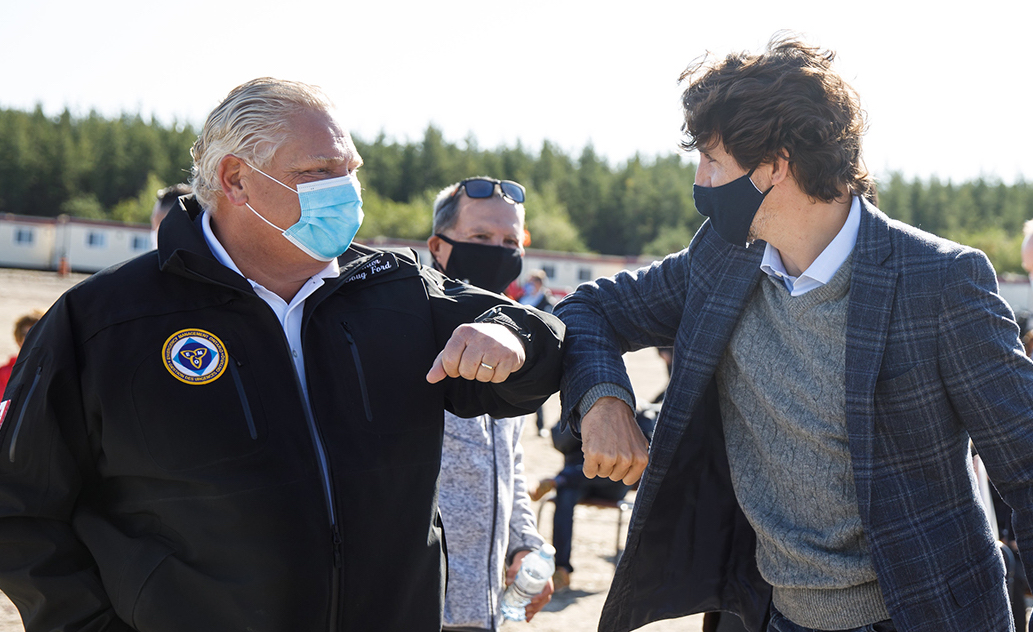Making government work for people requires skillful leadership, capable public servants, and financial muscle.
In the age of neoliberalism, government is assigned a much-reduced role. Political leadership amounts to standing aside in favour of the corporate sector; optimum public service means the leaner the better; and financial muscle means limiting government investment in the future, and avoiding debt, so as to avoid inflation — because inflation constitutes a tax on the wealthy and that would never do.
In the neoliberal imagination, it’s private investors who create wealth, not the working population. Neoliberalism is the world seen from the point of view of private investment — and the common good is nowhere in sight.
Currently Canada has seven conservative-governed provinces: Alberta, Saskatchewan, Manitoba, Ontario, Quebec, New Brunswick, and Prince Edward Island. All except P.E.I. take neoliberal politics seriously.
Prior to the pandemic, Justin Trudeau was trying to make the Canadian federation work by encouraging provincial autonomy and granting authority to the premiers.
The prime minister as “head waiter to the provinces” was the way Pierre Trudeau characterized his Conservative opponent Joe Clark. What the senior Trudeau decried has been pursued by his son without any notable success.
Whether it be the failure to control climate change or the open privatization of health care, the “leave it to the provinces” policy is not serving the needs of Canadians.
The COVID-19 pandemic has revealed the structural weaknesses of 40 years of predominately neoliberal policy direction in Ottawa. The conservative provincial premiers remain in denial.
Make the minimum wage a living wage so that front-line workers receive financial recognition for their contribution to our collective well-being? Conservatives prefer people’s wages to be set like carrots or potatoes through short-term supply and demand, while promoting the idea that full employment — which would help raise wages — needs to be rejected because it could lead to inflation (that pesky tax on the rich).
Put long-term care facilities into the public sector where they belong, for the safety of those seniors who have not already perished as a result of neglect? Conservative premiers have failed to acknowledge a link between the higher death rate in private facilities and the need to invest in long-term care, including those facilities already in public hands.
Borrow money to invest in environmental protection, public transit, culture, recreation, amateur sport? Conservative premiers are averse to using provincial borrowing power for the common good, despite record-low interest rates.
Despite howls of rage from the Western conservative premiers, attacking his person and his policies, Trudeau prefers not to engage in debate with them.
The Team Trudeau approach is to avoid upsetting potential supporters. Speaking out boldly always risks offending voters. Taking a public stance on anything but widely accepted policies or positions is a major part of how Trudeau goes about his business.
As explained by the late biographer Blair Neatby, former prime minister William Lyon Mackenzie King developed a strategy for dealing with provincial premiers looking to score points with their public by blaming the prime minister when things went poorly.
King designated powerful cabinet ministers with a regional base to take on responsibility for relations with premiers. Prime minsters since have followed his recipe (without equalling his longevity as prime minister and party leader).
Significantly, as CCPA senior economist David Macdonald has pointed out, the provinces are under-spending the money allocated to them by Ottawa to address the pandemic. Raising provincial voices to blame Trudeau for bungling the procurement of vaccine is how the neoliberal premiers respond to Ottawa providing 92 per cent of the $343 billion in direct-spending initiatives to combat COVID-19.
In these conflictive circumstances, demonstrating skillful leadership requires that federal ministers answer the premiers directly for their criticism and point out the weaknesses in provincial performance.
Though breaking with austerity, the Trudeau government remains attached to various failed neoliberal policies.
The Liberals created a much-needed public infrastructure bank — then gave it a mandate to privatize the few remaining public assets.
A true public investment bank would have purchased pharmaceutical manufacturing facilities to replace those foolishly privatized, like the world-class Connaught Laboratories, famous for its links to the discovery of insulin.
Neoliberal tax subsidies to multinational pharmaceutical giants introduced by Brian Mulroney did not stop them from leaving the country.
These same companies, once enriched by the Canadian government, now refuse to either manufacture here or provide vaccines to Canada at the same rhythm as to their home countries.
Neoliberal policies are failing Canada. When will Ottawa recognize and act on it?
Duncan Cameron is president emeritus of rabble.ca and writes a weekly column on politics and current affairs.
Image credit: Adam Scotti/PMO




